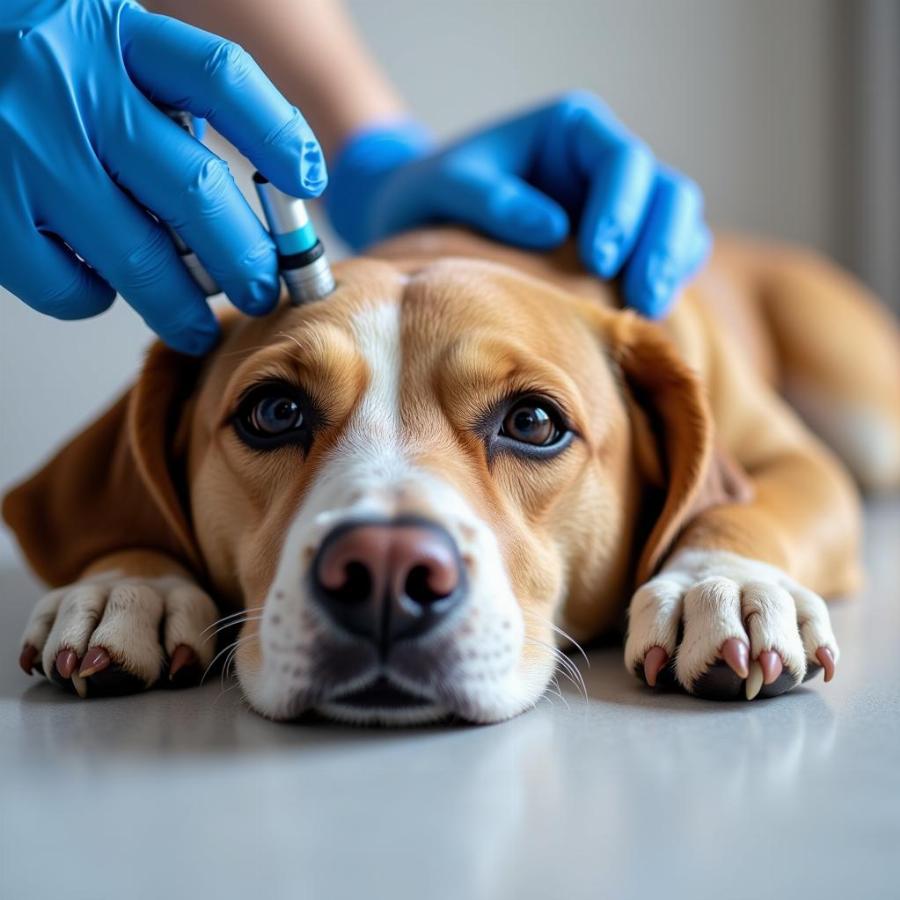Elspar, also known by its generic name asparaginase, is a chemotherapy drug sometimes used in veterinary medicine to treat lymphoma in dogs. While not as commonly used as other chemotherapy agents, Elspar can be a valuable tool in managing this specific type of cancer in our canine companions. This article delves into the uses, dosage, and potential side effects of Elspar for dogs, providing pet owners with crucial information to understand this treatment option better.
What is Elspar and How Does it Work?
Elspar is classified as an antineoplastic enzyme medication. In simpler terms, it interferes with the growth and spread of cancer cells. It works by breaking down asparagine, an amino acid that certain cancer cells, particularly lymphoma cells, need to survive and multiply. By depleting asparagine levels, Elspar essentially “starves” these cancer cells, inhibiting their growth and ultimately leading to their destruction.
When is Elspar Used for Dogs?
In veterinary medicine, Elspar is primarily used to treat lymphoma in dogs. Lymphoma is a type of cancer that affects the lymphatic system, a crucial part of the immune system. While Elspar isn’t a cure for lymphoma, it can effectively slow down the progression of the disease and alleviate clinical signs, improving the quality of life for affected dogs.
While primarily used for lymphoma, Elspar might be considered in treating other types of cancers in dogs, such as:
- Osteosarcoma: An aggressive bone tumor.
- Mast cell tumors: Tumors affecting a type of white blood cell.
- Multiple myeloma: Cancer affecting plasma cells in bone marrow.
The decision to use Elspar for these cancers depends on various factors, including the specific type and stage of cancer, the dog’s overall health, and potential side effects.
Understanding Elspar Dosage for Dogs
Determining the appropriate Elspar dosage for a dog is complex and requires careful consideration by a qualified veterinarian. Dosage calculations typically involve factors like:
- Weight: The dog’s weight is a significant factor in dosage calculation.
- Treatment protocol: Different chemotherapy protocols might call for varying doses and administration schedules.
- Individual response: A dog’s response to the medication can influence dosage adjustments.
Elspar is typically administered via injection, either intravenously or intramuscularly. The frequency of administration also varies depending on the treatment protocol, ranging from once a week to every few weeks.
It’s crucial to understand that administering Elspar at home without veterinary supervision is dangerous. The drug requires careful handling and precise dosing to ensure efficacy and minimize the risk of side effects.
 Veterinarian Administering Elspar Injection
Veterinarian Administering Elspar Injection
Recognizing Potential Side Effects of Elspar in Dogs
While Elspar can be effective in treating certain cancers in dogs, it’s essential to be aware of the potential side effects. These can vary from mild to severe and may include:
- Allergic reactions: Elspar can cause allergic reactions in some dogs, ranging from mild skin rashes to severe anaphylaxis, a life-threatening allergic response requiring immediate veterinary attention.
- Gastrointestinal upset: Vomiting, diarrhea, and loss of appetite are common side effects.
- Pancreatitis: Elspar can potentially lead to inflammation of the pancreas, a serious condition.
- Liver enzyme elevation: Changes in liver enzymes might occur, requiring monitoring through blood tests.
- Blood clotting issues: Elspar can interfere with blood clotting, increasing the risk of bleeding or bruising.
Monitoring for any unusual signs or symptoms after Elspar administration is crucial. Immediate contact with a veterinarian is essential if any concerning side effects occur.
Is Elspar the Right Choice for Your Dog?
Deciding on Elspar treatment for your canine companion is a significant decision best made in consultation with a veterinary oncologist. They can assess your dog’s individual situation, considering the type and stage of cancer, overall health, potential benefits, and risks associated with Elspar therapy.
Open communication with your veterinarian, including discussing any concerns or questions about Elspar, is vital. They can provide you with the knowledge and support you need to make informed decisions regarding your furry friend’s health and well-being.
Frequently Asked Questions about Elspar for Dogs
1. How effective is Elspar in treating lymphoma in dogs?
Elspar can be effective in inducing remission in some dogs with lymphoma, but it’s not a cure. Its efficacy varies depending on the type and stage of lymphoma and the individual dog’s response to treatment.
2. Can Elspar be used alongside other cancer treatments?
Yes, Elspar is often used as part of a multi-modal treatment approach for canine lymphoma. This may involve combining it with other chemotherapy drugs, radiation therapy, or surgery.
3. How long will my dog need to be on Elspar?
The duration of Elspar treatment varies depending on the treatment protocol and your dog’s response. Some dogs may receive Elspar for several weeks or months.
4. What are the signs of an allergic reaction to Elspar in dogs?
Allergic reactions to Elspar can manifest as facial swelling, hives, difficulty breathing, vomiting, diarrhea, collapse, or seizures. Seek immediate veterinary attention if you notice any of these signs.
5. What should I do if my dog experiences side effects from Elspar?
Contact your veterinarian immediately if your dog shows any side effects from Elspar. They can advise you on whether to adjust the dosage or discontinue the medication.
Seeking Further Information and Support
Navigating your dog’s cancer diagnosis and treatment can be overwhelming. Remember, you’re not alone. Your veterinary team is your most valuable resource during this challenging time.
For additional information about canine lymphoma, other cancer types in dogs, or to explore different treatment options, you may find helpful resources on our website. Consider reading our articles on:
- Canine Lymphoma: A Comprehensive Guide
- Understanding Chemotherapy for Dogs
- Managing Side Effects of Cancer Treatment in Dogs
Beaut Dogs is your trusted source for reliable and compassionate information about dog health and well-being. When you need support, don’t hesitate to reach out. Contact us at [email protected] to get your questions answered. Beaut Dogs is here to support you and your furry friend every step of the way.